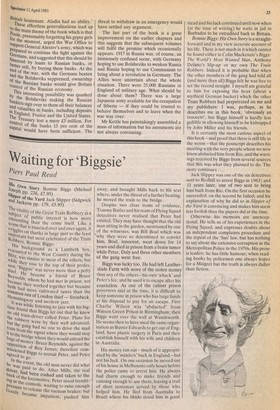Waiting for Tiggsie'
Piers Paul Read
His Own Story Ronnie Biggs (Michael Joseph pp. 238, £7.95) Slipper of the Yard Jack Slipper (Sidgwick and Jackson pp. 179, £5.95) The vitality of the Great Train Robbery as a subject — of public interest is how more astounding than the crime itself. Like, a worm that is bisected over and over again, it riggles On thanks in large part to the least 'InPortant but most celebrated of the Train Robbers, Ronnie Biggs. ' His background as a Lambeth boy, evacuated to the West Country during the Blitz, Was similar to most of the others; but While they rose to the top of their professl°a, `Biggsie' was never more than a petty tbuief. He became a friend of Bruce L'‘eYnolds, whom he had met in prison, not .uecause they worked together but because btlth had more cultivated tastes than the e,ontnion run of London thief— Steinbeck, tlemmingway and modern jazz. „It was while listening to jazz with his bigtime friend that Biggs let Out that he knew an old train-driver called Peter. Plans for the robbery were by then well advanced, hut the gang had no one to drive the mail train from the signal where they would stop it to the bridge where they would unload the bags of money. Bruce Reynolds, against the oPposition of Roy James, therefore commissioned Biggs to recruit Peter, and Peter agreed to go. In the event, the old man never did what "e. was paid to do. After Mills, the real driver, had been coshed and taken to the pack of the locomotive, Peter stood trembling at the controls, waiting to raise enough Pressure to release the vacuum brakes: but Goody became impatient, pushed him away, and brought Mills back to Kis seat where, under the threat of a further beating, he moved the train to the bridge.
Despite two clear items of evidence, Tommy Butler and his team of Flying Squad detectives never realised that Peter had existed. They may have thought that the old man sitting in the garden, mentioned by one of the witnesses, was Bill Boal which was why they were so determined to convict him. Boal, innocent, went down for 14 years and died in prison from a brain tumor while Peter, Daly and three other members of the gang went free.
Biggs was lucky too. He had left Leatherslade Farm with more of the stolen money than any of the others his own 'whack' and Peter's fee; and he used it to escape after his conviction. As one of the calmer prison governors said at the time, it is difficult to keep someone in prison who has large funds at his disposal to pay for an escape. First Charlie Wilson was 'abducted' from Winson Green Prison in Birmingham; then Biggs went over the wall at Wandsworth. He seems then to have used the same organisation as Buster Edwards to get out of England, have plastic surgery in Paris and then establish himself with his wife and children in Australia.
His money ran out – much of it appropriated by the 'minders' back in England – but not his luck. On one occasion he moved out of his house in Melbourne only hours before the police came to' arrest him. He always had charm enough to make friends and cunning enough to use them, leaving a trail of short sentences served by those who helped him. He fled from Australia to Brazil where his libido stood him in good stead and his luck continued until now when (at the time of writing) he waits in jail in Barbados to be extradited back to Britain. Ronnie Biggs: His Own Story is a straightforward and in my view accurate account of his life. There is not much in it which cannot be found either in Colin Mackenzie's Biggs: The World's Most Wanted Man, Anthony Delano's Slip-up or my own The Train Robbers. Indeed it is probable that when the other members of the gang had told all (and more than all) Biggs felt he was free to set the record straight. I myself am grateful to him for exposing the hoax (about a mythical German backer) which the other Train Robbers had perpetrated on me and my publishers: I was, perhaps, as he describes me in this book, 'obviously an innocent', but Biggs himself is hardly less gullible in allowing himself to be kidnapped by John Miller and his friends.
It is certainly the most curious aspect of this book – and proof that there is still life in the worm – that the postscript describes his meeting with the very people whom we now know abducted him from Rio, and the warn ings received by Biggs from several sources that this was what they planned to do. The story continues .
Jack Slipper was one of the six detectives sent to Redhill to arrest Biggs in 1963; and 11 years later, one of two sent to bring him back from Rio. On the first occasion he succeeded, on the second he failed; and his explanation of why he did so in Slipper of the Yard is convincing and makes him seem less foolish than the papers did at the time.
Otherwise his memoirs are unexceptional. He tells us of his experiences in the Flying Squad, and expresses doubts about an independent complaints procedure and the repeal of the 'Sus' law, but has nothing to say about the extensive corruption in the Metropolitan Police in the 1970s. His prose is leaden; he has little humour; when read ing books by policemen one always hopes for a Maigret but the truth is always duller than fiction.










































 Previous page
Previous page